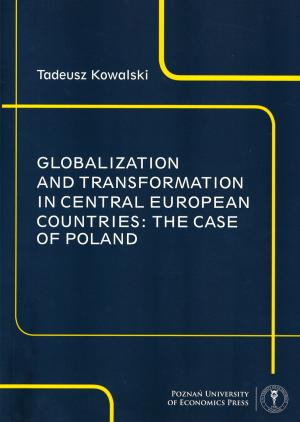Tadeusz Kowalski
Globalization and Transformation in Central European Countries: The Case of Poland
Dostępność i zakup
Wersja elektroniczna(CEEOL)
*Kliknięcie przycisku powoduje przeniesienie na zewnętrzną platformę udostępniania lub sprzedaży.
Kowalski, T. (2013). Globalization and Transformation in Central European Countries: The Case of Poland. Wydawnictwo Uniwersytetu Ekonomicznego w Poznaniu.
The aim of the book is present and assess the relationship of globalization and market transformation of Poland at the background of development of selected CE and SE countries. The first Chapter identifies and assesses the interplay between liberalization and the course of events in the contemporary globalization stage. The second Chapter is devoted to post WWII economic policy. It shows the economic policy experience and theory available for CECs both at the outset of their market transformation and intellectual climate preceding the economic and financial events that erupted in 2007-2008. The third Chapter reviews and assesses literature on financial crises. On the one hand they stemmed from human errors, on the other their pace of development and scope of contagion they caused should be seen as negative externalities of globalization. Both crises, but in particular the global financial crisis that began in the US in 2007 had harmful consequences for CECs. Following the first three Chapters the aim of the fourth Chapter is an empirical evaluation and comparison of Poland’s economic performance during market transformation against the background of results achieved in the same period, on the one hand by Hungary, the Czech and Slovak Republics and Ukraine, and on the other by SECs. The fifth Chapter, linked with the fourth is devoted to the major institutional aspect of economic transformation: privatization in Poland. The aim of the sixth Chapter is twofold. The first is to empirically assess the macroeconomic performance of the Polish consecutive democratic accountability terms against the background of economic results achieved in CECs and SECs in 1990-2012. The second aim, referring to findings of Chapter three, is empirical evaluation and comparison of economic performance of Poland and CECs and SECs during the Asian and global financial crises.
Introduction
1. Contemporary globalization and liberalization
1.1. Globalization
1.1.1. The notion of globalization
1.1.2. Periodization of globalization
1.1.3. Liberalism as a foundation of the contemporary stage of globalization
1.2. Globalization vs. Schumpeterian creative destruction
1.3. Analytical approaches to globalization
1.3.1. Macroeconomic level
1.3.2. Mezzo and micro aspects of globalization
1.4. Economic and financial diseąuilibria. Stylized facts
1.4.1. Supply side and trade of goods
1.4.2. Financial flows
1.5. Nation state vs. globalization
Conclusions
2. Economic policy in the modern time
2.1. Economic trends after 1945
2.2. Theory and practice of economic policy
2.2.1. The general background
2.2.2. Approaches to economic policy design
2.3. The 2008-2009 recession implications for economic theory and policy
2.3.1. Pre-crisis consensus in theory and practice of economic policy
2.3.2. New outlook on economic policy
Conclusions
3. Globalization and financial crises
3.1. Modern financial crises
3.1.1. Typology
3.1.2. Currency crises
3.1.3. Current account (CA) or capital account (CapA) crises
3.1.4. Foreigndebt crises
3.1.5. Systemie banking crisis
3.2. Asian crisis of 1997
3.2.1. Pre-crisis development in East Asian economies
3.2.2. Major attributes of the 1997-1998 East Asia crisis
3.2.3. Global financial market in the 1990s
3.3. The 2007-2009 crisis and its evolvement
3.3.1. General background
3.3.2. Economic policy reactions
3.3.3. Economies reactions to the crisis
Condusions
4. Economic transformation in Central Europę
4.1. Analytical background of comparative analysis
4.1.1. Macroeconomics and institutional conditions in the CECs at the stabilization phase
4.1.2. Transformation vs. growth theory and competitiveness
4.2. The first phase of the transformation process in the CECs
4.2.1. Initial conditions in Poland and in selected CECs
4.2.2. Stabilization programs and first reactions of the CECs‘ economies
4.3. Phase of growth
4.3.1. Population and human capital development
4.3.2. Investments
4.3.3. Foreign trade liberalization
4.3.4. Structural changes triggered by economic growth, transformation and globalization
4.4. GDP per capita and competitiveness
Closing remarks
5. Privatization. The case of Poland
5.1. Introduction to the theory of privatization
5.1.1. Microeconomic approach
5.1.2. Macroeconomic perspective
5.2. Importance of privatization in political and institutional reforms of 1989/1990
5.2.1. Stability pact and market reform agenda
5.2.2. Attitudes to privatization
5.2.3. Current progress of privatization
5.3. Specific naturę of Polish privatization
Conclusions
6. Poland‘s economic performance compared
6.1. Political and institutional context of transformation in Poland
6.1.1. The Polish political scenę and parliamentary elections
6.1.2. Pace of lawmaking in 1990-2012
6.2. Perception of institutional evolvement in Poland
6.2.1. Sample and ąuestionnaire
6.2.2. Discussion of results
6.3. Comparative analysis of economic performance of democratic accountability terms in Poland
6.4. Comparative analyses of economic performance in the crises
6.4.1. East Asian crisis
6.4.2. The global financial crisis
Conclusions
Afterword
Bibliography

Metadane
- ISBN: 978-83-7417-776-4
- e-ISBN:
- Wydanie: I
- Rok wydania: 2013
- Rok premiery: 2013
- Strony: 231
- Wersja papierowa:
- Wersja elektroniczna:
- Format: B5
- Licencja: open access
globalization, transformation, central European economies, financial crises, economic policy, economic performance, comparative analysis
ostatni tydzień: 24
ostatnie 3 miesiące: 224
ogółem: 1182


